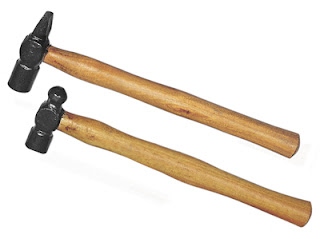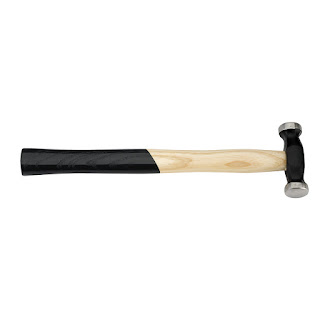Different Types of Hammers and their Uses
Hammers
are available in a variety of weights and sizes, each one intended for a
particular job. There are hammers for use in many different trades, including
blacksmithing, carpentry, and vehicle repair.
Claw and
Framing Hammers
While these hammers all include a round head for
driving nails, the claw end is every bit as effective for prying, splitting
wood, tearing drywall, and other small demolition operations. On a claw hammer,
the claw is curved; on framing hammers, it is straight.
These hammers are useful for:
·
Woodworking
·
Splitting
·
Framing
·
Finishing
·
Small Demolition
·
Prying
Ball Pein
Hammer Use
The ball pein hammer was initially developed to be
used for peening, or hammer-shaping metal products. The head's one end has a
spherical form on one side for this reason. Driving is done with the flat end
on the other.
Ball peen
hammers use:
·
Metalworking
·
Punching and Riveting
·
Rounding Edges
Dead Blow
Hammer
These hammers are made to strike surfaces hard, and
the term "dead blow" refers to the fact that they would not rebound
after impact.
Dead blow hammers are best for:
·
Setting Joints
·
Automotive Applications
·
Installing Floor Boards
Engineering
and Drilling Hammers
Chisels and punches are driven with the help of the
hand drilling hammer's substantial head. These hammers often have a wedged peen
opposite the head and a flat face with rounded edges.
Engineering and drilling hammers are used for:
·
Driving
·
Chiseling and Punching
·
Forging and Shaping Metal
Blacksmith’s
Hammer
The blacksmith’s hammer is a type of sledgehammer with
a bit rapier and round on the other head. Red-hot steel is shaped against the
anvil using it.
Sledge hammer
Stakes can be driven using a sledge hammer, as well as
demolition activity. They have long handles that range from over 2 feet to just
over 3 feet, and their heads can weigh up to 20 pounds. They may also be made
of fibreglass, but often have wooden handles.
Trim Hammer
A trim hammer is only a little, straight-claw hammer
that may be used to drive trim nails without harming anything nearby. It is
comparable in size and weight to a tack hammer.
Cross Pein
Hammer
This particular style of the hammer features a face
pan on one end and a pan constructed at a right angle to the handle’s tapered
end.
Precautions
for Using Hammers
·
The handle of the hammer must not
be covered in oil, grease, or any other lubricant, and if is it, it must be
well cleaned.
·
Hammer handles should be simple;
otherwise, burns on the palm may result.
·
The handle of the hammer should be
kept tight to prevent it from slipping out and perhaps causing an accident.
·
The hammer’s face should be
thoroughly ground if it becomes mushroom-shaped from repeated use.
·
Always grasp the end of the hammer
handle to conserve energy.
·
Depending on the tasks at hand, we
should select the best hammer possible.
How to
Effectively Store Hammers?
·
You must preserve your new tools
appropriately if you want to get the most out of your purchase. The use of an
appropriate storage system can mainly prevent tool degradation.
·
Keep your hammers dry and out of
the way of moisture by storing them in a toolbox or on a hammer rack.
·
You can also use a dehumidifier to
get rid of moisture and extend the life of your tools. To minimize moisture,
you can also utilize silica gel packs that absorb moisture.
Final Say
A hammer is
a tool used for striking blows on objects, metals, driving pins, etc., as you
are probably aware. There are numerous hammers available in every industry.
Depending on their use, some are typical and some are special. Ajay Industries is the leading company in delivering their hammers all
over the world.
.jpg)





